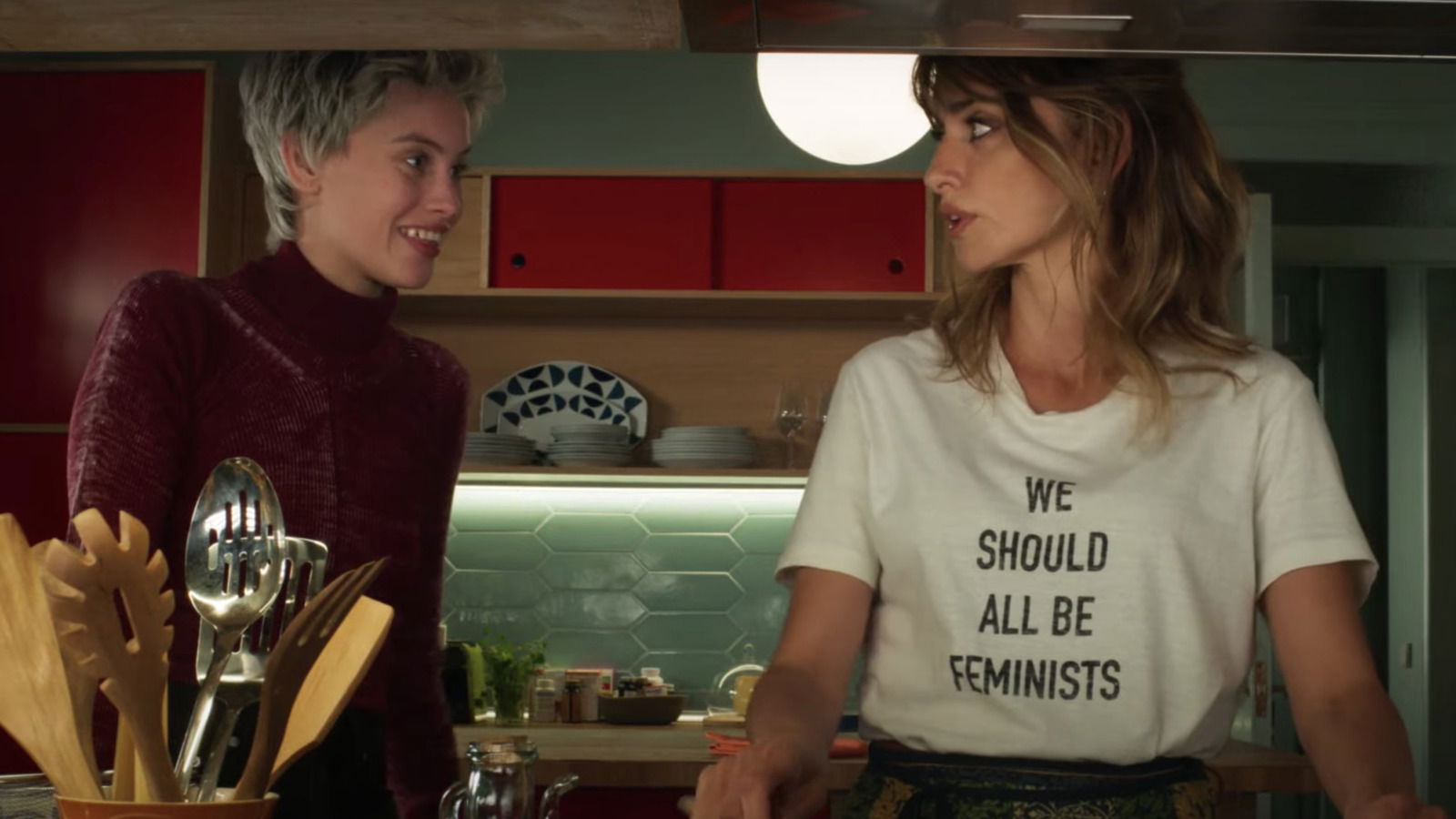Parallel Mothers, a film by Pedro Almodóvar.

Of all living film directors, the Spanish Pedro Almodóvar is the one who has responded most positively to feminist criticism of the limited way that 20th-century cinema presented women. Almodóvar has risen to the challenge and created films where women have all the lead roles, relationships between women are central and women’s issues are the focus.
“Parallel Mothers” [Madres Paralelas] his latest film, does not disappoint. It is fresh, full of surprises and features a stunning performance by Penélope Cruz. It focuses on the intense emotions of two mothers, neither of them married, who give birth at the same time in the same hospital ward. The elder one Janis, (Penelope Cruz) is happily if accidentally pregnant after a passionate affair. Her lover is an archaeologist who has promised to help her trace the remains of her great-grandfather, a victim of Franco’s Falangists at the start of the Civil War. The younger one, Ana (Milena Smit), feels traumatised and scared, as her pregnancy is the result of a nightmare experience. Both stories are linked to pressing Spanish issues – La Memoria Histórica (excavating the mass graves of Franco’s victims) and La Violencia de Género (encouraging women to speak out about abuse and sexual violence). Almodóvar is hitting quite a raw nerve for many Spaniards in weaving these themes into his film.
Eighteen year old Ana finally admits she got pregnant after being coerced into sex with several men, a crime which she has not reported to the authorities. Drink, drugs, internet bullying and blackmail all had their part in her predicament. Janis says, “But that’s rape!” and the girl shrugs. Who would want the negative publicity that went with bringing a case? This story is calculated to awaken memories in a Spanish audience of La Manada, the Wolf Pack case, which caused widespread anger and a huge wave of protest a few years ago.
The shocking event occurred in Pamplona on 7th July 2016, the night before the Running of the Bulls, a big public festival. An eighteen-year- old girl, who had become separated from her friends, was lured into an empty building and raped by five men who called themselves The Wolf Pack. One of those men was a member of the Guardia Civil. The men were arrested, but the trial was seriously compromised when details of it were aired on social media, turning the plaintiff’s life into an enduring hell.
For many women across the country, even before the verdict arrived, the case had been a moment of reckoning, which laid bare a deep culture of misogyny in Spanish society. In April 2018, the verdict was finally delivered and the court acquitted all five men of rape, finding them guilty of the lesser crime of “sexual abuse”. Because the victim had been drunk, the men had not needed to use violence, therefore the crime could not technically be categorised as rape.
The feminist protest against this travesty filled the streets and flooded social media. The hashtag #Cuéntalo (Tell your story) was created, inviting women to recount their stories of sexual abuse or sexual assault. In a key moment in Almodóvar’s film, Janis turns to Ana, angry at her fatalism and says “It’s high time you understood about the country you’re living in.”
The protests provoked an anti-feminist backlash from the rightwing Vox party, leading some to feel that new battle-lines were being drawn, dividing Spain in a way reminiscent of the Civil War.
Janis’s burning ambition is to locate the “fosa” (mass grave) where her great-grandfather was dumped after being shot by Franco’s Falangists at the start of the Civil War. The archaeologist she has contacted, Arturo, works for the Association for the Recovery of Historical Memory, a group who excavate and identify the bodies, while collecting oral testimonies about their killing.
In his relationship with Janis, Arturo [Israel Elejalde] goes through every stage of the irresponsible male, from carefree adulterer to “You do know you don’t have to have it?” and then, “I don’t think it’s mine, are you sure you didn’t sleep with anyone else?” From that point, redemption may seem unlikely but in the world of Almadovar, as in ours, anything is possible.
Almodóvar depicts the profound need of Janis and her family to find their lost loved ones and establish the truth clearly without denial or doubt. The dead great-grandfather must be placed alongside his wife in the family grave. “Memoria Histórica” is another painfully divisive issue in Spain. Janis actually reminds us that the right-wing Prime Minister of a few years ago, Mariano Rajoy, when asked how much support in euros he would give to the cause of Historical Memory, replied “zero.” This is all the more ironical since under Rajoy there was talk of repatriating from Russia the bodies of members of the Blue Division, which Franco had sent to fight for Hitler on the Eastern Front in the 1940s.
At the end of the film, the skeletons are found and the families find closure. Ultimately, Almodóvar’s theme is the courage of those who go in search of their identity. It is a drama about mothers, but it is also a drama about Spain.